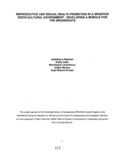Reproductive and sexual health promotion in a sensitive socio-cultural environment developing a module for the grassroots
Citation
Nasreen, H. E., Cash, K., Chowdhury, M., Bhuiya, A., & Ahmed, S. M. (1999). Reproductive and sexual health promotion in a sensitive socio-cultural environment developing a module for the grassroots. Research Reports (1999): Health Studies, Vol - XXVIII, 212–249.Abstract
The general population of Bangladesh is in poor health, has little access to health
facilities, has increasing incidence of STDs and is in close proximity to countries with high rates
of HIV/AIDS. Up to date little has been done to educate rural Bangladesh citizens about STDs
including HIV/AIDS, RTls and other sexual and reproductive health problems. In 1997 a sexual
and reproductive health project began in a rural community under the collaborative research
model of two organizations, the International Centre for Diarrheal Disease Research (ICDDR,B)
and the Bangladesh Rural Advancement Committee (BRAC), an indigenous non-governmental
organization which pursues integrated rural development strategies. The goal of this project
was to improve the sexual and reproductive health of rural women, men and youth in
Bangladesh.
The target population was a representative sample of the rural poor. Initial qualitative
in-depth interviews with 65 different women, men, boys and girls revealed significant sexual
health problems and experiences and little knowledge about treatment and prevention. Data
from these initial interviews was transformed into a series of flip-charts which contained both
sex education information and picture stories that mirrored risk behavior. Because of the
sensitive nature of the topics, only those who had perceived legitimacy to talk about sexual
health were identified and trained. Sixty eight health providers and 1890 community people
were trained.
Qualitative evaluations of health providers revealed significant changes in their
knowledge and bt4iiefs about sexual health and disease. Health providers integrated the
program into their ongoing work. Furthermore, they reported improvements in their selfconfidence,
btJsiness, personal interactions with their family members and with their clients due
to this program. In conclusion, this program demonstrated that a gender-sensitive sexual and
reproductive health initiative could be a positive force for change in a rural Bangladesh setting.

